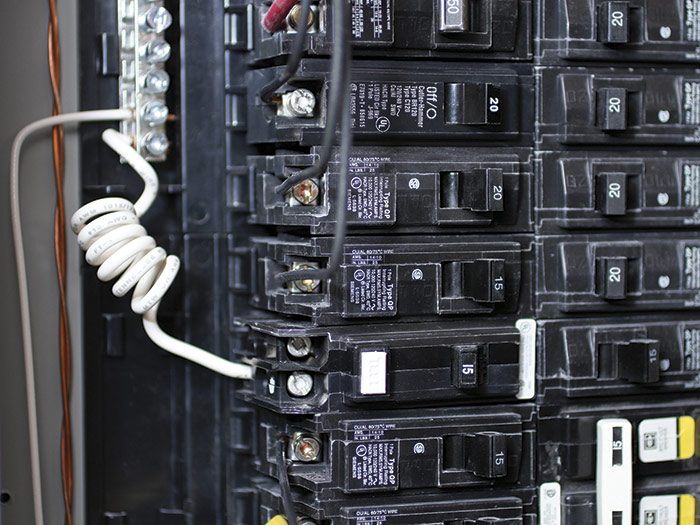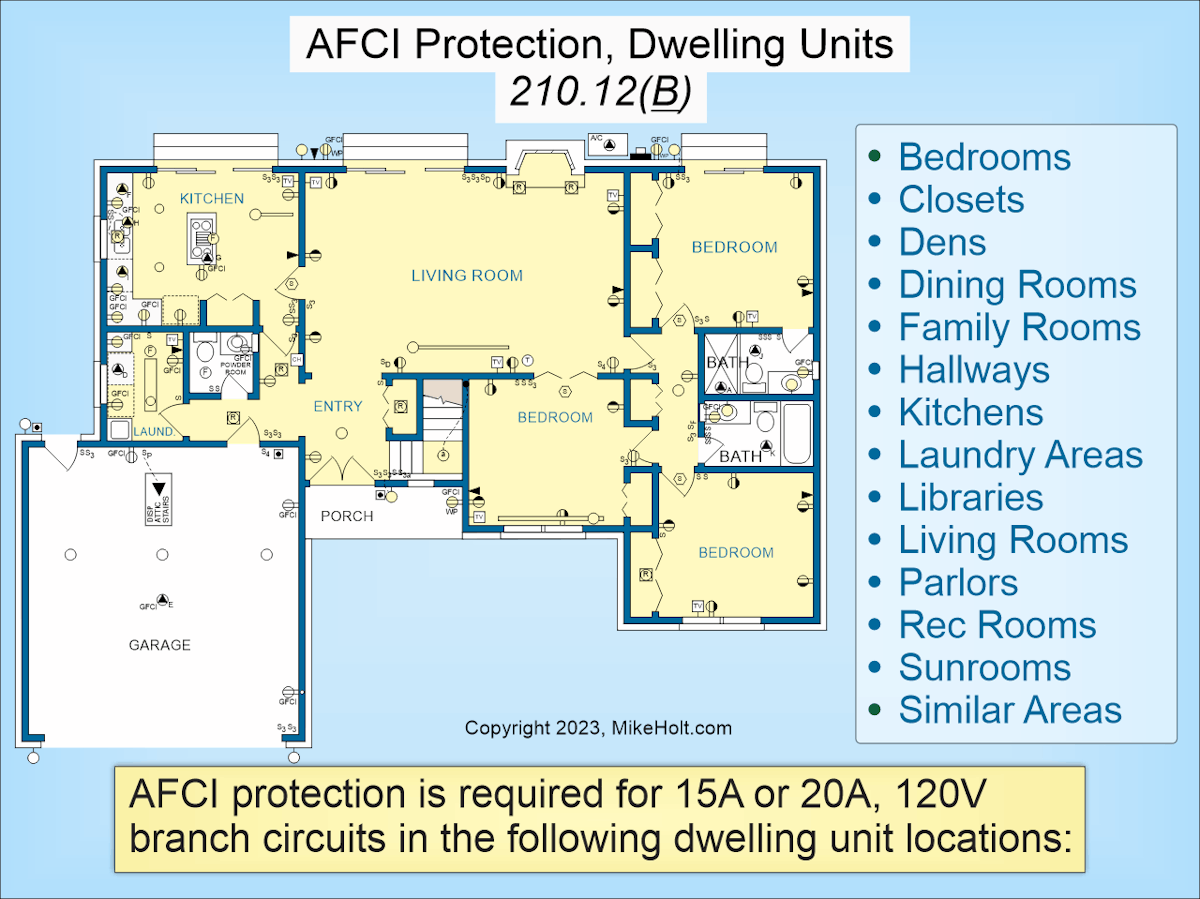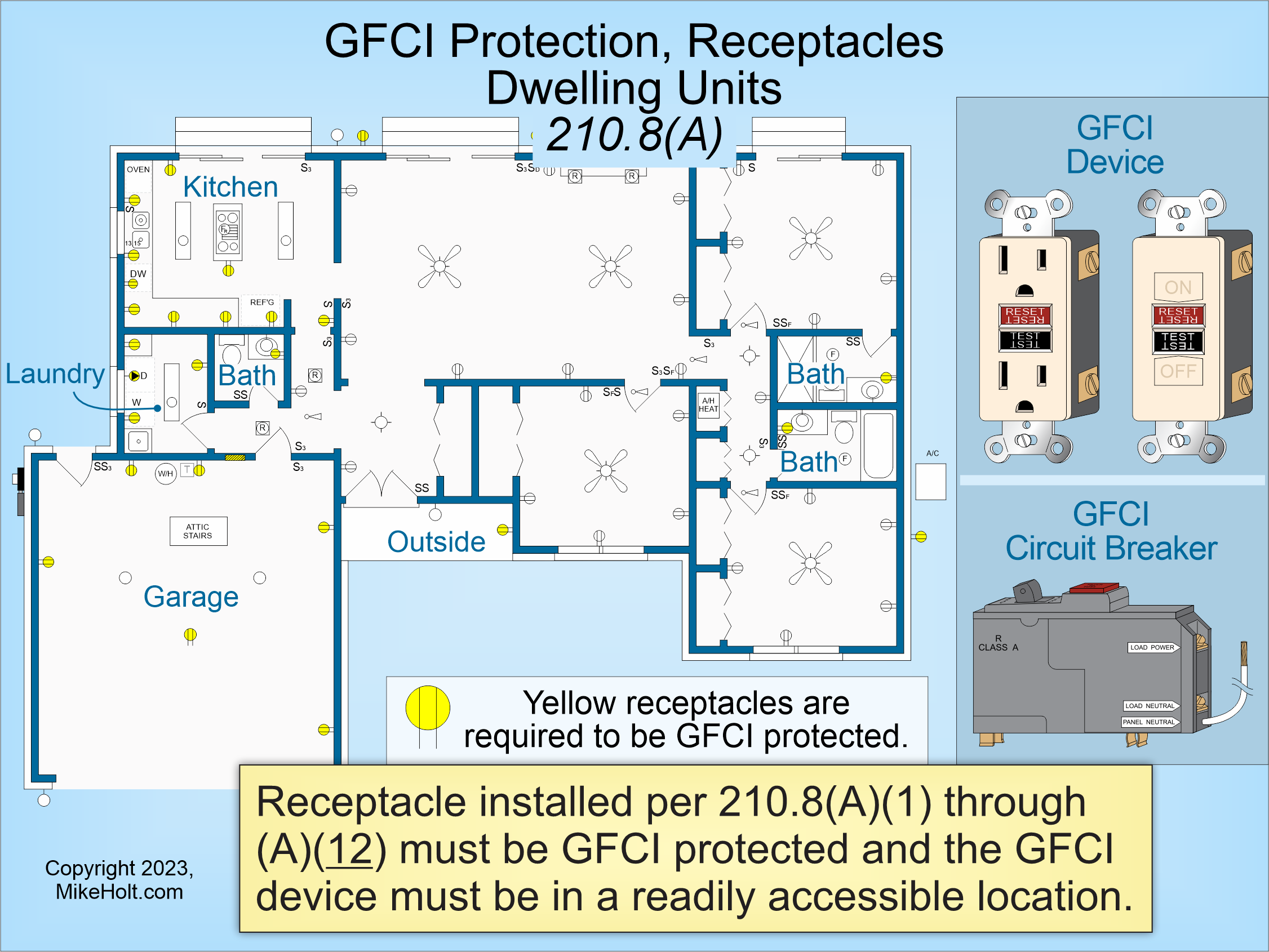Great Info About Where Not To Use AFCI

AFCI Vs GFCI Interrupters Compared The Guide
Understanding AFCI Protection
1. What Exactly Is an AFCI Outlet?
Alright, let's get this straight first. AFCI stands for Arc Fault Circuit Interrupter. Think of it as a super-sensitive electrical safety net. It's designed to detect dangerous electrical arcs — those little sparks that can lead to big, smoky fires. They're those little zap sounds and flashes of light that are actually pretty dangerous.
Basically, AFCIs constantly monitor the electrical current in a circuit. If it detects an arc fault (a sudden, unintended electrical discharge), it quickly shuts off the power to prevent a fire. Its like a superhero for your electrical system, swooping in to save the day before things get too heated (literally!).
They're usually recognizable as outlets or circuit breakers with a "Test" button on them. Pressing that button simulates an arc fault, ensuring the device is working correctly. Regular testing is a good idea, just to make sure your electrical guardian is still on the job. Think of it as giving your superhero a high five.
AFCIs are now required in many areas of the home, as per building codes, particularly in bedrooms. This is because bedrooms often have appliances and devices that can contribute to arc faults, like lamps, phone chargers, and extension cords snaking behind furniture. The goal is to provide an extra layer of protection where people are most vulnerable — while they're sleeping!

Installing An AFCI Breaker Fine Homebuilding
Where AFCI Might Be More Trouble Than They're Worth
2. Places Where AFCIs Could Be Triggering False Alarms
Okay, so AFCIs are great, but sometimes they can be a little too sensitive. Like that friend who cries during every movie, even the action flicks. Certain appliances and situations can cause nuisance tripping, where the AFCI shuts off the power even when there's no actual fire hazard. This can be frustrating, to say the least, and sometimes even a bit disruptive.
One common culprit is older appliances with brushed motors. Things like older vacuum cleaners, some blenders, or power tools can generate electrical noise that the AFCI mistakes for an arc fault. It's like the AFCI is misinterpreting the appliance's grunts and groans as a cry for help. Suddenly you're mid-vacuuming, and BAM! Lights out. And not the fun kind of lights out.
Another area to consider is circuits with long wire runs. The longer the wire, the more potential for voltage drop and other electrical quirks that can confuse the AFCI. Its kind of like how a long game of telephone can distort the original message. The electrical signal gets a little garbled along the way, and the AFCI overreacts.
Also, think about appliances that create brief surges of current. Items like refrigerators and freezers, when the compressor kicks on, can sometimes trigger an AFCI. This doesn't mean the appliance is faulty, just that the AFCI is being extra cautious. It's like the AFCI is seeing a shadow and assuming it's a monster. A slightly inconvenient, power-cutting monster.

NEC Requirements For GFCIs And AFCIs EC&M
Specific Locations Where AFCIs Might Not Be Ideal
3. Understanding Circumstances Where AFCI Application Is Debatable
So, we've covered general situations, but let's get specific. Where are some places where you might reconsider slapping an AFCI on the circuit? Think about areas where consistent power is crucial and false tripping could have serious consequences. We're not advocating for ignoring safety, just highlighting situations that might require a more nuanced approach.
Consider a dedicated freezer circuit in a basement or garage. If the AFCI trips and you don't notice for a few days, you could end up with a freezer full of thawed (and potentially spoiled) food. Not only is this a bummer, but it's also a potential waste of money and resources. In this case, a regular circuit breaker combined with regular checks might be a better compromise.
Another area to think about is circuits powering essential medical equipment. If someone relies on a CPAP machine or other medical device, a sudden power outage could be dangerous. While AFCIs are designed to prevent fires, the risk of a false trip in this scenario might outweigh the benefits. This is definitely a situation to discuss with a qualified electrician to weigh the risks and benefits carefully.
And what about workshops? While electrical safety is paramount in a workshop, the nature of power tools — their frequent use, potential for wear and tear, and tendency to generate electrical noise — can increase the likelihood of nuisance tripping. Again, careful consideration and potentially alternative safety measures (like regularly inspecting tools and cords) might be more practical than relying solely on an AFCI.

Troubleshooting & Solutions
4. What To Do When Your AFCI Keeps Shutting Off The Power
Alright, so you're experiencing the dreaded nuisance tripping. Don't panic! There are a few things you can try before resorting to drastic measures. First, try isolating the problem. Unplug everything on the circuit and then plug them back in one at a time, waiting to see if the AFCI trips. This can help you identify which appliance might be the culprit.
If you identify a specific appliance that's causing the issue, you have a few options. You could try plugging it into a different circuit (one without AFCI protection, if possible), or you could have the appliance inspected and repaired. It's possible that the appliance has a faulty motor or wiring that's triggering the AFCI.
Another solution, though not always ideal, is to replace the AFCI breaker with a newer model. Sometimes, older AFCIs are simply more prone to nuisance tripping than newer, more advanced versions. This can be a relatively inexpensive fix that might solve your problem. However, make sure the new AFCI meets current code requirements.
If none of these solutions work, it's time to call in a professional electrician. They can thoroughly inspect the circuit, identify any underlying electrical issues, and recommend the best course of action. They might even suggest alternative wiring configurations or other safety measures to prevent nuisance tripping without compromising safety. Remember, fiddling with electricity is never a good idea if you're not qualified!

The Balancing Act
5. Weighing The Pros and Cons of AFCI Protection
Ultimately, deciding where not to use AFCIs is a balancing act. You need to weigh the benefits of arc fault protection against the potential for nuisance tripping and the inconvenience it can cause. There's no one-size-fits-all answer, and the best approach will depend on your specific situation and electrical setup. Think of it like choosing the right tool for the job — sometimes a hammer is perfect, and sometimes you need a more delicate instrument.
It's crucial to remember that AFCIs are designed to save lives and prevent fires. They're a valuable safety feature that shouldn't be dismissed lightly. However, it's also important to be realistic about their limitations and potential drawbacks. Sometimes, a more holistic approach to electrical safety — including regular inspections, proper wiring practices, and careful appliance maintenance — might be a more effective solution than relying solely on AFCIs.
Always consult with a qualified electrician before making any changes to your electrical system. They can assess your specific needs, advise you on the best safety measures, and ensure that all work is done in accordance with local electrical codes. Trying to DIY electrical work can be dangerous and could even violate building regulations. So, leave it to the pros when in doubt!
In conclusion, while AFCIs are a valuable safety tool, understanding where they might cause more problems than they solve is essential for a safe and practical electrical setup. Carefully consider the specific circumstances, weigh the risks and benefits, and always consult with a qualified electrician to ensure the best possible outcome. After all, electricity is a powerful force, and it's best to treat it with respect and caution.

FAQ
6. Common Inquiries About Arc Fault Circuit Interrupters
Q: Are AFCIs required in my area?
A: That depends on your local building codes. Electrical codes change over time, so it's best to check with your local building department or a qualified electrician to find out the current requirements in your area. They'll be able to tell you where AFCIs are mandatory and if there are any exceptions.Q: Can I replace a regular circuit breaker with an AFCI breaker?
A: Yes, in many cases you can. However, it's crucial to make sure the circuit wiring is in good condition and that the AFCI breaker is compatible with your electrical panel. It's also essential to follow all safety precautions and turn off the power to the circuit before attempting any electrical work. If you're not comfortable doing it yourself, hire a qualified electrician.Q: What's the difference between an AFCI and a GFCI outlet?
A: Good question! While both are safety devices, they protect against different hazards. AFCI protects against arc faults (sparks that can cause fires), while GFCI (Ground Fault Circuit Interrupter) protects against electric shock by detecting current leakage to ground. GFCIs are commonly used in bathrooms, kitchens, and other wet locations. They serve different purposes and are often both required in certain areas of the home.